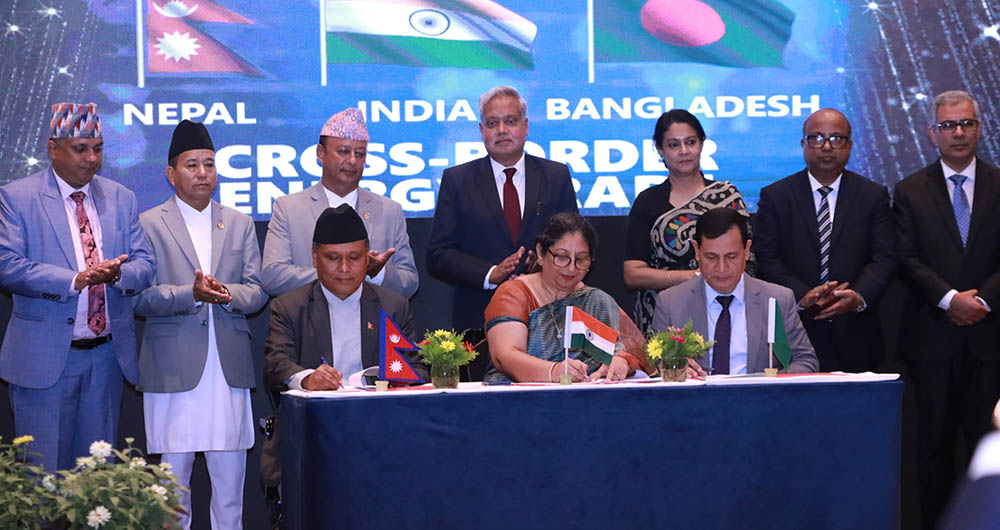- Wednesday, 14 January 2026
Trilateral pact signed to export Nepal's electricity to Bangladesh
Kathmandu, Oct. 4: Nepal is all set to export electricity to Bangladesh. This historic milestone was achieved after Nepal India and Bangladesh signed a tripartite agreement allowing Nepal to sell its electricity to Bangladesh using the land and transmission infrastructure of India.
Nepal Electricity Authority (NEA), Bangladesh Power Development Board (BPDB) and NTPC Vidyut Vyapar Nigam (NVVN) signed the agreement at a programme organised in Kathmandu on Thursday.
Executive Director of the NEA, Kulman Ghishing, Chairman of BPDB, Mohammad Rezaul Karim, and CEO of NVVN, Renu Narang signed the agreement on behalf of their respective organisation and country.
Minister for Energy, Water Resources and Irrigation, Deepak Khadka of Nepal, Minister for Forest, Environment, Climate Change and Water Resources, Syeda Rizwana Hasan of Bangladesh and Indian Ambassador to Nepal, Naveen Srivastava were present on the occasion.
In the first phase, Nepal will export 40 megawatt of electricity to Bangladesh during the wet season – six months from mid-June to mid-November, for the next five years.
According to the NEA, electricity generated from the NEA developed companies-- 25 MW Trishuli and 22 MW Chilime hydroelectricity projects will be exported to Bangladesh at the rate of 6.40 US cent. Ghishing said that Nepal is likely to earn US$ 9.2 million (about Rs. 1.22 billion) a year by exporting power to Bangladesh.
Meter of the energy export would be installed in Mujaffarpur, India, and the losses up to that point would be borne by the NEA and losses from Mujaffarpur to Bangladesh border would be the responsibility of Bangladeshi company while the wheeling charges for the use of NVVN's transmission line would be paid by Bangladesh.
15,000MW to India, Bangladesh
Ghishing said that Nepal has a target of exporting 10,000-MW electricity to India and 5,000 MW to Bangladesh.
Nepal signed a Memorandum of Understanding (MoU) with India in January this year for the export following India's announcement in September 2023 to import the electricity of that amount for a 10-year period.
Earlier in December 2023, Bangladesh had approved a proposal from the BPDB to import 40 MW electricity from Nepal. In the following months, the NEA and BPDB had also agreed upon the rate of energy trade and preparations were made for the final agreement but the political upheaval in Bangladesh affected the process. Before the fall of the Sheikh Hasina's government, the two countries were in the final phase of inking electricity trade agreement for 40 MW and Bangladesh's minister for state for energy was scheduled to come to Nepal.
A prolonged effort
This historic feat was achieved after a hiatus of about a decade. In its Energy System Master Plan formulated in 2016, Bangladesh had mentioned that it would import electricity from Nepal. But there was an obligation to use the Indian infrastructure and a fresh agreement with the southern neighbour to transmit electricity from Nepal to Bangladesh.
Bangladesh had said that it could buy as much as 9000 MW electricity from Nepal that could provide an immense opportunity for the latter to reduce trade deficit with the former. In 2018, Bangladesh had pointed to the need for a trilateral and multilateral framework for the energy trade in the region.
The then Bangladeshi ambassador to Nepal, Mashfee Binte Shams had said that the power-starving south Asian nation was even ready to make investment of up to US$ 1 billion in hydropower projects in Nepal. By then, India had given a positive nod for the facilitation in Bangladesh's power trade with Nepal and Bhutan. Bangladesh, the country that is being upgraded to a 'developing nation' from a Least Developed Country (LDC) along with Nepal in 2026, will require 34,000 MW of power by 2030 to sustain its growth.
Last year, a secretary-level committee of Nepal and Bangladesh had agreed to develop 683 MW reservoir-based Sunkoshi III Hydroelectricity project with joint investment. Now India has also been incorporated as an investor in the project.
Likewise, in 2019, Bangladesh government had decided to purchase 500 MW electricity from the GMR Upper Karnali Hydroelectricity Project but the project development is still in a limbo.
Meanwhile in March 2021, Nepal was making preparations to export about 200 MW electricity during wet season to Bangladesh by July end that year. But that remained just a talk.
A regional achievement
Speaking at the agreement signing programme, Energy Minister Deepak Khadka of Nepal said that the agreement was a big regional achievement.
"Nepal's success in exporting electricity to a third country for the first time in its history has become an important cornerstone for the South Asian region," he said.
According to him, the Nepal-Bangladesh energy sector cooperation agreement reached in 2018 was the result of continuous efforts and it is important and historic not only for Nepal but also for South Asia and BBIN region.
Minister Khadka expressed his belief that the agreement would further strengthen the friendly relations between Nepal's neighbouring countries and said that the Government of Nepal was ready to cooperate with India and Bangladesh to achieve the goals in the energy sector.
Bangladeshi Water Resources Minister Syeda Rizwana Hasan, mentioned that the tripartite agreement was a cornerstone in the direction of creating common prosperity and mutual commitment of South Asian countries. "This agreement is of great importance to safely achieve the national demand of Bangladesh and the global needs and the goal of sustainable development," she said.
Likewise, Indian envoy to Nepal, Srivastava, said that the cooperation among the three countries would be further expanded in the future.
Ghishing, ED of NEA, said that the agreement was a result of mutual cooperation and mutual understanding of the expanding energy sector in South Asia. He said that Nepal has become the first country in South Asia to export electricity to a third country. "This electricity export agreement is also a model of reducing emissions, expanding relations between citizens of different countries," he said.








-square-thumb.jpg)




-original-thumb.jpg)



